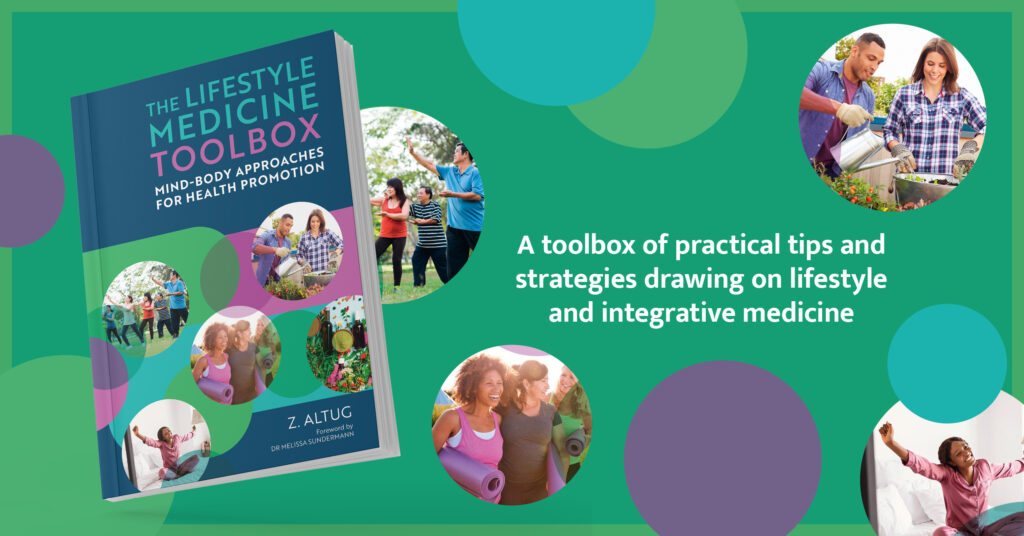Creating Your Lifestyle Medicine Toolbox

This blog post was written by Ziya “Z” Altug, PT, DPT, MS, OCS, CSCS
This blog will highlight sleep hygiene, stress management and social connectedness as parts of creating a lifestyle medicine toolbox for patients and clients.
First, what is lifestyle medicine? Frates and colleagues (2021) define lifestyle medicine as “The use of evidence-based lifestyle therapeutic approaches, such as a predominately whole-food and plant-based diet, regular physical activity, adequate sleep, stress management, avoidance of risky substance use, and other non-drug modalities to treat, oftentimes reverse, and prevent the lifestyle-related, chronic disease that’s all too prevalent.”
Sleep Hygiene Toolbox
The following are some simple patient/client education strategies that may help patients improve sleep:
- Establish a regular bedtime and waking hours (avoid or minimize “social jet lag” that may be due to work, school, or your personal schedule).
- Create a comfortable room that is cool, dark, and quiet.
- Sleep in a comfortable bed and make sure it’s not too old.
- Use a supportive and comfortable pillow and ensure it’s not too old.
- Eliminate nighttime caffeine and limit daytime caffeine.
- Do not wear tight or restrictive clothing during sleep
- Eliminate/limit after-dinner and late-night snacking.
- Limit or avoid computer use and smartphone use near bedtime.
- Avoid intense exercise near bedtime. However, do exercise and be physically active during the day.
- Maintain a healthy body mass index (BMI).
- Avoid watching intense television shows before bedtime.
- Turn off the radio and television before going to sleep.
- Avoid bright light near bedtime, but do increase daytime exposure to sunlight.
- Consider reducing your fluid intake near bedtime to avoid (or minimize) getting up to go to the bathroom, but maintain adequate hydration during the day.
- Minimize sugar and salt intake near bedtime as it may cause increased trips to the bathroom.
- Learn strategies to reduce daily stress so it does not result in poor quality and quantity of sleep.
Stress Management Toolbox
The following are some simple patient/client education strategies that may help patients manage stress:
- Engage in outdoor physical activities such as walking, hiking, biking
- Engage in outdoor activities such as gardening
- Participate in hobbies such as reading, pottery, painting, playing music
- Try yoga, tai chi, qigong
- Use aromatherapy (such as lavender)
- Play with pets
- Get a massage
- Get involved in social activities such as volunteering, coaching, and community dancing
- Listen to music
- Smile and laugh more by watching comedy movies or television shows
Social Connectedness Toolbox
The following are some simple patient/client education strategies that may help patients improve socialization and social connectedness:
- Attend local sporting events, music performances, or art and museum exhibits.
- Connect with family and friends locally or on Zoom.
- Connect with your physician, therapist, wellness, or fitness professional via telehealth-delivered services.
- Create or join a community garden club.
- Create or join a lunchtime walking, yoga, or tai chi club.
- Engage in conventional group exercises such as softball, volleyball, basketball, pickleball, paddle tennis, or tennis.
- Engage in mind-body exercises such as yoga, tai chi, or Pilates.
- Engage in work-related community activities and fitness programs.
- Engage in small conversations with cashiers and employees at various stores you visit.
- Engage with members at your community place of worship.
- Enroll in art-based community activities, such as art, dance, drama, music, poetry, pottery, or expressive writing classes.
- Enroll at a local or community college to take cooking, history, or astronomy classes.
- Get a library card and participate in book club events.
- Get involved in nature-based activities, such as bird watching, botanical garden and park visits, farmer’s market shopping, forest bathing or hiking, gardening, or walks at a lake, river, or beach.
If you are interested in learning more about these topics and others, please see The Lifestyle Medicine Toolbox book from Jessica Kingsley Publishers (2024). For additional information, see the www.lifestylemedicinetoolbox.com.
Sources:
- American College of Lifestyle Medicine. Handout: Lifestyle stress reduction. American College of Lifestyle Medicine; 2019.
- Choi NG, Pepin R, Marti CN, Stevens CJ, Bruce ML. Improving social connectedness for homebound older adults: randomized controlled trial of tele-delivered behavioral activation versus tele-delivered friendly visits. Am J Geriatr Psychiatry. 2020;28(7):698-708.
- Frates B, Bonnet JP, Joseph R. & Peterson JA. Lifestyle Medicine Handbook: An Introduction to the Power of Healthy Habits, 2nd ed. Monterey, CA: Healthy Learning; 2021.
- Roland M, Everington S, Marshall M. Social prescribing – transforming the relationship between physicians and their patients. N Engl J Med. 2020;383(2):97-99.
- Vitale KC, Owens R, Hopkins SR, Malhotra A. Sleep hygiene for optimizing recovery in athletes: review and recommendations. Int J Sports Med. 2019;40(8):535-543.